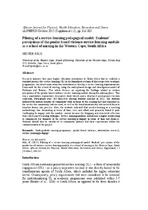Piloting of a service-learning pedagogical model: student perceptions of the gender based violence service-learning module at a school of nursing in the Western Cape
Abstract
Research indicates that most higher education institutions in South Africa fail to establish a standard practice for service-learning (SL) in the formalised systems of their respective academic programmes. An intervention study was undertaken to develop a service-learning implementation framework for the school of nursing, using the multi-phased design and development model of Rothman and Thomas. This article focuses on reporting the findings related to student perceptions of the gender-based violence service-learning module during the piloting phase. This was a quantitative, exploratory, descriptive study which used a structured questionnaire for data collection. Participants were 162 final-year nursing students enrolled in 2012. The students indicated the mutual benefits of community work in terms of the learning they had experienced,
the service the community had received, as well as the transformation that had assisted them to translate theory into practice. Also, the students indicated that service-learning as a teaching methodology was demanding in terms of time, cost, and effort, and generally found it quite challenging to engage with the module content because the blogging and structured reflection were cited as new teaching strategies. Service-learning modules should bear a higher credit rating to compensate for demands of the service-learning pedagogy in terms of time and finances. Students should also be introduced to community partners and their expectations before the commencement of the project.

